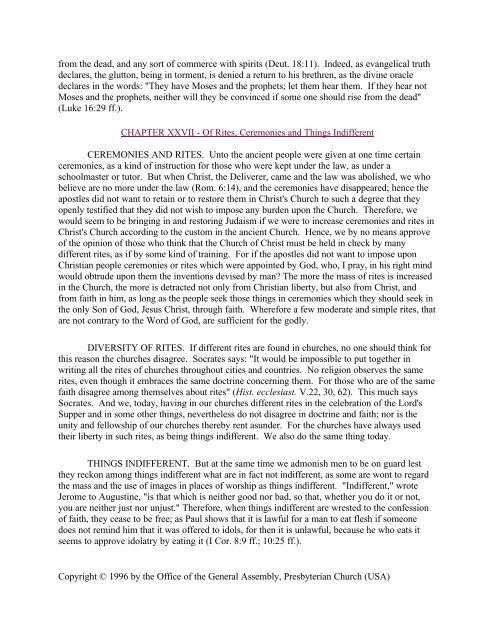The Book of Confessions - The Presbyterian Leader
The Book of Confessions - The Presbyterian Leader
The Book of Confessions - The Presbyterian Leader
Create successful ePaper yourself
Turn your PDF publications into a flip-book with our unique Google optimized e-Paper software.
from the dead, and any sort <strong>of</strong> commerce with spirits (Deut. 18:11). Indeed, as evangelical truth<br />
declares, the glutton, being in torment, is denied a return to his brethren, as the divine oracle<br />
declares in the words: "<strong>The</strong>y have Moses and the prophets; let them hear them. If they hear not<br />
Moses and the prophets, neither will they be convinced if some one should rise from the dead"<br />
(Luke 16:29 ff.).<br />
CHAPTER XXVII - Of Rites, Ceremonies and Things Indifferent<br />
CEREMONIES AND RITES. Unto the ancient people were given at one time certain<br />
ceremonies, as a kind <strong>of</strong> instruction for those who were kept under the law, as under a<br />
schoolmaster or tutor. But when Christ, the Deliverer, came and the law was abolished, we who<br />
believe are no more under the law (Rom. 6:14), and the ceremonies have disappeared; hence the<br />
apostles did not want to retain or to restore them in Christ's Church to such a degree that they<br />
openly testified that they did not wish to impose any burden upon the Church. <strong>The</strong>refore, we<br />
would seem to be bringing in and restoring Judaism if we were to increase ceremonies and rites in<br />
Christ's Church according to the custom in the ancient Church. Hence, we by no means approve<br />
<strong>of</strong> the opinion <strong>of</strong> those who think that the Church <strong>of</strong> Christ must be held in check by many<br />
different rites, as if by some kind <strong>of</strong> training. For if the apostles did not want to impose upon<br />
Christian people ceremonies or rites which were appointed by God, who, I pray, in his right mind<br />
would obtrude upon them the inventions devised by man? <strong>The</strong> more the mass <strong>of</strong> rites is increased<br />
in the Church, the more is detracted not only from Christian liberty, but also from Christ, and<br />
from faith in him, as long as the people seek those things in ceremonies which they should seek in<br />
the only Son <strong>of</strong> God, Jesus Christ, through faith. Wherefore a few moderate and simple rites, that<br />
are not contrary to the Word <strong>of</strong> God, are sufficient for the godly.<br />
DIVERSITY OF RITES. If different rites are found in churches, no one should think for<br />
this reason the churches disagree. Socrates says: "It would be impossible to put together in<br />
writing all the rites <strong>of</strong> churches throughout cities and countries. No religion observes the same<br />
rites, even though it embraces the same doctrine concerning them. For those who are <strong>of</strong> the same<br />
faith disagree among themselves about rites" (Hist. ecclesiast. V.22, 30, 62). This much says<br />
Socrates. And we, today, having in our churches different rites in the celebration <strong>of</strong> the Lord's<br />
Supper and in some other things, nevertheless do not disagree in doctrine and faith; nor is the<br />
unity and fellowship <strong>of</strong> our churches thereby rent asunder. For the churches have always used<br />
their liberty in such rites, as being things indifferent. We also do the same thing today.<br />
THINGS INDIFFERENT. But at the same time we admonish men to be on guard lest<br />
they reckon among things indifferent what are in fact not indifferent, as some are wont to regard<br />
the mass and the use <strong>of</strong> images in places <strong>of</strong> worship as things indifferent. "Indifferent," wrote<br />
Jerome to Augustine, "is that which is neither good nor bad, so that, whether you do it or not,<br />
you are neither just nor unjust." <strong>The</strong>refore, when things indifferent are wrested to the confession<br />
<strong>of</strong> faith, they cease to be free; as Paul shows that it is lawful for a man to eat flesh if someone<br />
does not remind him that it was <strong>of</strong>fered to idols, for then it is unlawful, because he who eats it<br />
seems to approve idolatry by eating it (I Cor. 8:9 ff.; 10:25 ff.).<br />
Copyright © 1996 by the Office <strong>of</strong> the General Assembly, <strong>Presbyterian</strong> Church (USA)




